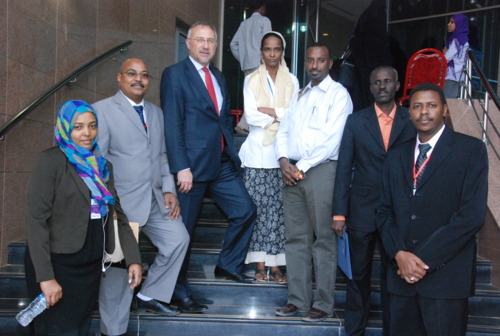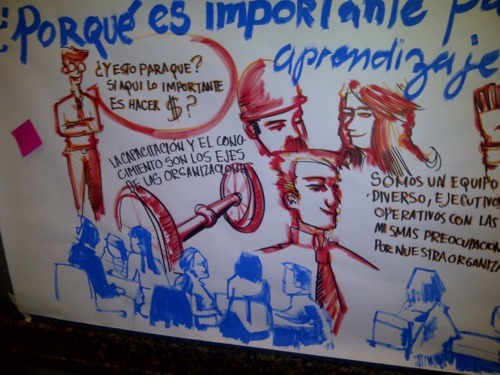I was back in Khartoum for a couple of days at the end of March at the invitation of the Sudan Engineering Society and University of Khartoum. They’d asked me to talk about knowledge management, research into the evolving role of the ‘knowledge manager’ and the implications for Sudan.
Apart from the honour of addressing 150 or so engineers, acadamics and ministers on Wednesday at the National Telecomunications Center, my presentation at the Faculty of Mathematical Science on Thursday was made at the end of the working day (so at the start of the Sudanese weekend) to a crowd of nearly 200 including families. It brought home to me how keen the Sudanese people are to learn and exchange ideas especially since the Campus had only just reopened after a period of unrest.
Knowledge management as a formal discipline is in its infancy in Sudan. There are pockets of good practice albeit under different labels and many companies are following the well trodden path of focusing on technology such as an intranet as a way of storing ‘stuff’. It’s not easy though operating in an environment which restricts access to software updates as an example. That said there is a groundswell of interest led by Dr Gada Kadoda who is mobilising a group calling itself the Sudanese Knowledge Society who are about to meet formally for the first time.

Photo Taken outside the National Telecommunications Center Khartoum with some of the founding members of the Sudan Knowledge Society
The Khartoum presentations prompted an interesting exchange with one of the participants who attended both. Here with his permission is an extract.
Hi Paul
Thank you. I have attended both sessions. All day on Wednesday and the Thursday evening session… Few years ago while I was working in the UAE, I came across The European Business Excellence Model and the work of Peter Senge at MIT ( The Learning Organization ). Is this KM a new Fad, old wine in new bottles or is it a real contribution to your management thinking? It seems to me I am getting mixed signals…. To this day I still remember Business Processes Reengineering, as advocated by Prof Michael Hammer at MIT
Best regards
Mustafa
The Rio Tinto video (about a Community of Practice) in my humble opinion is a Quality Circle drill, which was helped by the advance in ICT…
And my reply:
Dear Mustafa thank you for your kind words and the background.
You raise a number of interesting points, let me answer them in sequence:
- Old wine in a new bottle: to continue the analogy, if it is then it is ageing quite well as some 10 years ago Professor T D Wilson at Sheffield University in a paper entitled ‘The nonsense of knowledge management’ wrote the following:
The inescapable conclusion of this analysis of the ‘knowledge management’ idea is that it is, in large part, a management fad, promulgated mainly by certain consultancy companies, and the probability is that it will fade away like previous fads. It rests on two foundations: the management of information where a large part of the fad exists (and where the ‘search and replace marketing’ phenomenon is found), and the effective management of work practices. However, these latter practices are predicated upon a Utopian idea of organizational culture in which the benefits of information exchange are shared by all, where individuals are given autonomy in the development of their expertise, and where ‘communities’ within the organization can determine how that expertise will be used.
- Yet today as our research has indicated people and organisations are organising themselves to make better use of what they know and if knowledge management is a convenient label to achieve that then who are we to complain.
- Quality Circle vs Community of Practice: Yes and no would be my response. However for me the concept of a quality circle is much more around a particular incident (yes that was highlighted in the clip) but the idea of a Community of Practice is that it represents an ongoing and dynamic resource. The bigger point here I think is that the engineers were able to post something onto the platform used to run the CoP and locate people who’d had the same experience.
- As to BPR and the other management ‘fads’ I would say there is a difference. I see km as a horizontal thread running across the organisation; its a way of doing if you like a common sense approach to improving the sharing of what people and organisations know. BPR et al gave no consideration to the transfer of know how from experts about to depart or how to bring people who’ve just arrived in the business up to speed as quickly as possible. Where km falls down is that it is often put into a corporate siding – the place where communications, marketing and HR don’t want to tread and as a result does not have the institutional clout that more established disciplines have.
km has been written off many times and yet as research into the evolving role of the ‘knowledge manager’ has uncovered there are still a large number of people engaged in km type activity. Even with km in their job title (and many still don’t) they are having significant impact and reach across their organizations.
Yesterday for example I received a copy of the excellent Asian Development Bank Intersections digital newsletter and was drawn to an article entitled Ahead of the curve: the long reach of short tales by the Knowledge Management Center headed by Olivier Serrat which said
In 2010, ADB embarked on its most ambitious story-driven exercise yet. It launched the ADB Sustainable Development Timeline multimedia project, which currently hosts over 11 hours of sympathetic reminiscences and expertise rendered in video from 72 ADB staff. The material is broken down into 1–5 minute snippets covering a veritable plethora of topics, e.g., communities of practice, corporate governance, gender equity, forest conservation, knowledge management, renewable energy, sustainable infrastructure, etc. But, beyond these, the interactive platform also contains short documentaries of projects shot on location, sounds, B-roll footage, animations, graphics, voice-overs, videos, statistics, photo essays, etc. The product has been warmly received, both in and outside ADB, and augurs well for ready use in staff recruitment and induction, learning and development, conferences and other events, education, and external relations.
I am looking forward to continuing this discussion when I am at the 5th International Knowledge Management and Organizational Learning Summit in Bogota in May. More on that in a later posting.


